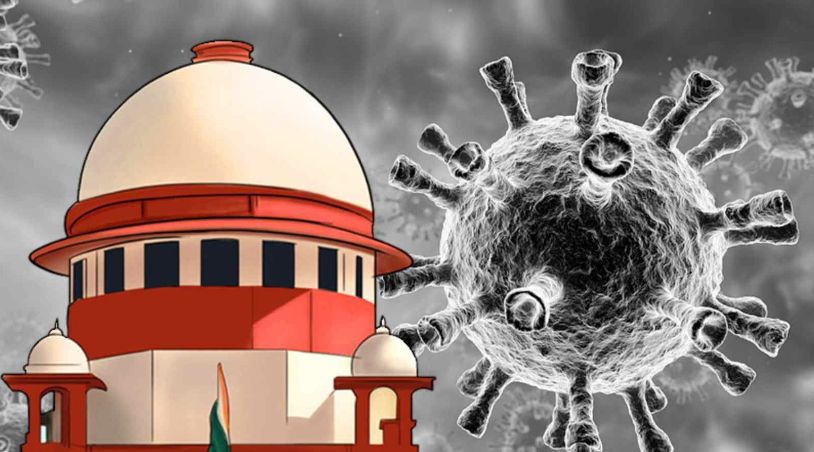The higher judiciary has pulled up and questioned the apathetic response of the centre regarding the management of the public health crisis unfolding in the wake of the second wave of the Coronavirus. The action from the Apex court comes at a time when the centre is trying to throw away the responsibility of handling the requirements of the hospitals on the states and certain state governments like that in UP are brushing away the grim picture. Involvement of the highest court comes at the correct time as the CM of UP had stated in an insensitive tone about invoking NSA on questioning of availability of Oxygen.
Also Read: Issues faced by India in dealing with Covid 19 resurge- Is it too late to contain the Second Wave
On Tuesday, Supreme Court of India flagged the differential vaccine pricing during a suo motu hearing on issues regarding Covid-19 management, asking for a clarification from the Centre on the issue, even as in an affidavit the government challenged what the GOI calls a “completely false narrative” that it had failed to anticipate the second surge.
Addressing the central government, a Bench of Justices D Y Chandrachud, L Nageswara Rao and S Ravindra Bhat said, “The Union of India shall also clarify in its affidavit the basis and rationale adopted in regard to the pricing of vaccines.”
Pointing out that the “different manufacturers are quoting different prices”, Justice Bhat chided Solicitor General Tushar Mehta, “There are powers under the Drugs Control Act and Patents Act. This is a pandemic and a national crisis. If this is not the time to invoke such powers, what is the time?”
The Bench of the Apex court also clarified that its hearing of Covid-19 matters would not “supplant or substitute the process of hearings undertaken by various High Courts to deal with issues related to the pandemic”, adding that it cannot be a “mute spectator” during “a national crisis”.
Also Read: Equal rights of daughters in joint Hindu family property- how far the Coparcenary law has come
The three-judge bench of justices D Y Chandrachud, L Nageswara Rao and S Ravindra Bhat said, “There are certain national issues to be dealt by the Supreme Court. At a time of national crisis, the Supreme Court cannot be a silent spectator. We are not preventing the High Courts from hearing. The Supreme Court intends to play a complimentary role.”
Supreme Court of India has again clarified that while taking up the shortage of oxygen, medicines, vaccines and other supplies in the Covid crisis, it did not intend to stop High Courts from hearing petitions in various states. The Apex court said that it wanted to play a complimentary role and could not be a silent spectator during what it called a “national calamity” for the country.
The judges further added that the Covid19 situation across the country along with the Oxygen shortage, is a “national calamity” and the court must protect the lives of citizens.
Last week, Supreme Court of India had decided to take up the problems related to distribution of oxygen, vaccines and medicines across the country amid rising number of Covid19 cases and had issued notice to the Centre in this regard. Calling for a “national plan”, the Apex court had said that six High Courts across the country were hearing-related petitions but there was confusion and diversion of resources.
Since then, the Apex court has repeatedly clarified that its intention was not to hijack the High Court cases.
In its affidavit to the Court submitted on Tuesday, the Centre listed the steps taken by it to meet the Covid-19 challenge, enumerating measures to boost oxygen supply on “a war footing” and ensuring drug supplies, and said that it was implementing “innovative measures”.
At the hearing, the Apex Court asked the Centre to “clarify the projected requirement of vaccine as a result of enhancement of coverage”, starting May 1, when vaccination opens to all above the age of 18 years, and to put in place modalities to look into shortages and deficit.
SCI asked for similar details on oxygen, asking the Solicitor General to appraise it about the supply, the projected need of states, the basis of allocation of oxygen from the central pool and the methodology adopted to communicate requirements of states.
Fixing the matter for next hearing on April 30, the Apex Court’s Bench also sought to know details regarding enhancement of critical medical requirements, including Covid-19 beds, and steps taken to ensure essential drugs such as remdesivir and favipiravir.
The three judges’ Bench noted that the High Courts were best situated to make assessment of ground realities in each state and find flexible solutions for problems faced by citizens.
Pulling up the centre on a suo moto basis regarding the Covid19 management and the issue of Oxygen, the bench has driven home the point that the Supreme Court’s intervention must be understood in the correct perspective.





